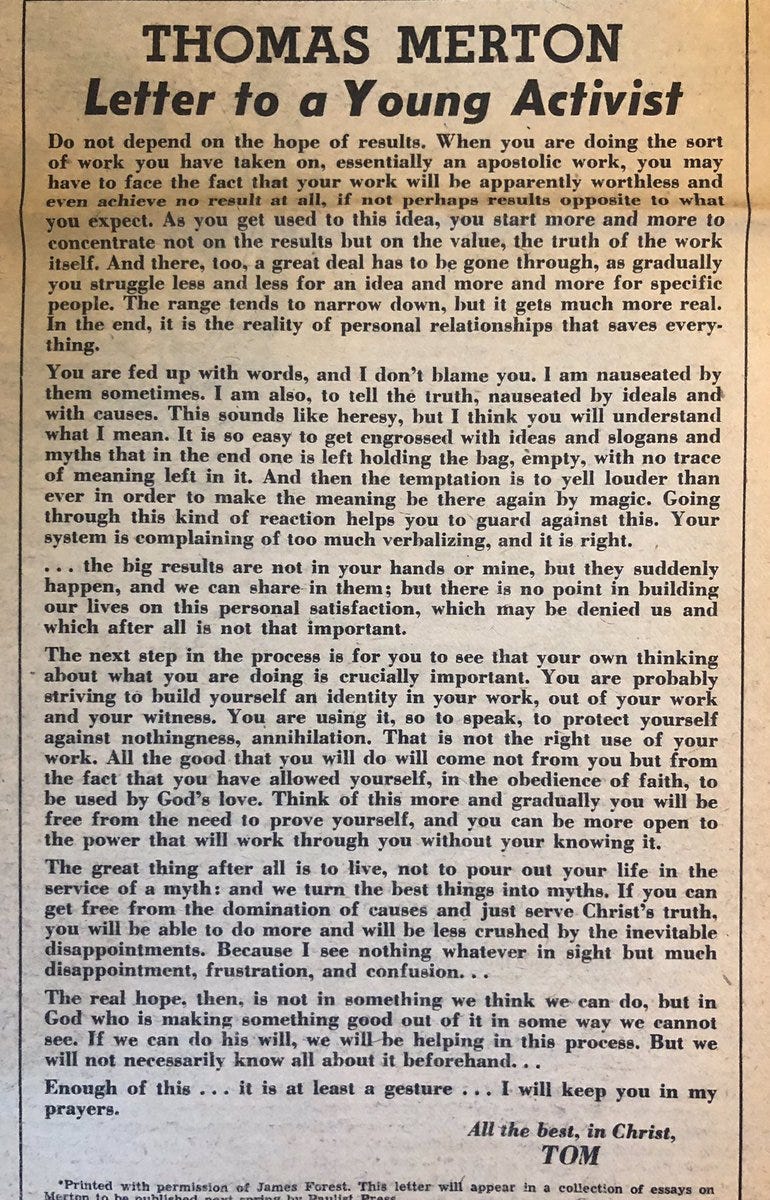Thomas Merton's words of hope for young activists
Written in 1966, Thomas Merton's Letter to a Young Activist has a lot to say to young Americans reeling from climate change, the pandemic, an uncertain economy and political alienation
There is certainly a lot of discouragement in the air with this new generation, many of whom are drawn to becoming activists. Many went to the streets after George Floyd’s murder to march, and then to the polls in 2020 to vote (the largest young voter turnout ever). But many believe little or nothing has happened about the issues they marched and voted for: voting rights, racial justice, policing reform, gun violence and climate change, to name some of the top issues they care about.
They see an older generation of political leaders – on both sides of the aisle – who they don’t feel relate to them and their concerns. A recent New York Times article with the headline Young Voters Are Fed Up With Their (Much) Older Leaders, reports: “While voters across the spectrum express rising doubts about the country’s political leadership, few groups are as united in their discontent as the young.”
In my work with Faiths United to Save Democracy to protect against voter suppression we are finding that young voter turnout is a big concern in ten key states where we are working. The Times piece quotes from a poll that reports many young people are feeling “disengaged and deflated, with only 32% saying they are ‘almost certain’ to vote in November.” Nearly half do not think their vote will make difference, according to the poll. From what I am seeing and hearing, the disillusionment and discouragement is coming from many things: older political elites unconnected to them, overall economic insecurity, the pandemic and a frustrating sense that the issues they care most about are not discussed at political table, particularly climate change, whose clear impacts we have witnessed this summer.
But there are deeper spiritual matters that I also see and hear. A friend recently reminded me of the Letter to a Young Activist that Trappist monk Thomas Merton wrote in 1966, and suggested that some of the same issues are again in play now. That letter was originally a personal response to Jim Forest, who was then a young activist and a founder of the Catholic Peace Fellowship, who felt deep discouragement over the Vietnam War. Forest, a friend of mine (he died in January) was depressed about how the war in Vietnam continued to move forward with such a loss of life for the Vietnamese, such brutality for the civilian population there, and such ignorance and indifference among the American people – including Christians and Catholics.
Merton was very sympathetic and empathetic about the difficult feelings of Forest, which he also felt. But Merton offered some advice to the young activist that is as relevant and applicable now as it was many decades ago. The mentor monk encouraged this young activist to not “depend on the hope of results.” You can’t depend upon what you cannot control or even predict, as much as you would like to make a difference. Instead, said Merton, the value of your work is in the work itself – its truth, rightness, and goodness. In a quote that I often use in my classes at Georgetown, Merton said that “everything is about relationships,” and that is what we must attend to. Everything gets narrowed down to specific people too, Merton said.
As much as we so deeply desire to turn around our national narratives and impact the national policies which are so important, we will never know if we will – no matter how much we try. Will we make a difference? Who knows? God only knows. And we never know whether what we have done will change things, or when God might work through us and our work, even unexpectedly; and we will never know beforehand what will happen and when. Do the work, find the value in it, focus on relationships, and be open to time tables that we cannot control or even predict. Often, we will be disappointed, but sometimes we will be surprised.
This work is not, and cannot, be mostly about us – our roles, our egos, our identities, our visibility, or our having other people think that we are important and the ones making an impact. Self-satisfaction cannot be the ultimate motivation for our work; but rather persistent faithfulness to what we know to be right, good, and true – and to the integrity of our relationships. That is what will lead to a trust in God’s grace and love and truth, which can work through us and even surprise us when it happens.

So for your summer reading, here is an excerpt from Thomas Merton’s letter to a young activist named Jim Forest, who was feeling many of the things that we all do. As I re-read it, I found myself feeling a little more grounded and anchored during what indeed are quite discouraging times. I hope you will too.
Dear Jim,
Do not depend on the hope of results. When you are doing the sort of work you have taken on, essentially an apostolic work, you may have to face the fact that your work will be apparently worthless and even achieve no result at all, if not perhaps results opposite to what you expect. As you get used to this idea, you start more and more to concentrate not on the results but on the value, the rightness, the truth of the work itself. And there too a great deal has to be gone through as gradually you struggle less and less for an idea and more and more for specific people. The range tends to narrow down, but it gets much more real. In the end, it is the reality of personal relationships that saves everything…
The big results are not in your hands or mine, but they suddenly happen, and we can share in them; but there is no point in building our lives on this personal satisfaction, which may be denied us and which after all is not that important.
The next step in the process is for you to see that your own thinking about what you are doing is crucially important. You are probably striving to build yourself an identity in your work, out of your work and your witness. You are using it, so to speak, to protect yourself against nothingness, annihilation. That is not the right use of your work. All the good that you will do will come not from you but from the fact that you have allowed yourself, in the obedience of faith, to be used by God’s love. Think of this more and gradually you will be free from the need to prove yourself, and you can be more open to the power that will work through you without your knowing it.
Nevertheless, you will probably, if you continue as you do, begin the laborious job of changing the national mind and opening up the national conscience. How far will you get? God alone knows. All that you and I can ever hope for in terms of visible results is that we will have perhaps contributed something to a clarification of Christian truth in this society, and as a result a few people may have got straight about some things and opened up to the grace of God and made some sense out of their lives, helping a few more to do the same. As for the big results, these are not in your hands or mine, but they can suddenly happen, and we can share in them: but there is no point in building our lives on this personal satisfaction, which may be denied us and which after all is not that important.
The great thing after all is to live, not to pour out your life in the service of a myth: and we turn the best things into myths. If you can get free from the domination of causes and just serve Christ’s truth, you will be able to do more and will be less crushed by the inevitable disappointments. Because I see nothing whatever in sight but much disappointment, frustration and confusion…
The real hope, then, is not in something we think we can do but in God who is making something good out of it in some way we cannot see. If we can do God’s will, we will be helping in this process. But we will not necessarily know all about it before hand…
Enough of this… it is at least a gesture… I will keep you in my prayers.
All the best, in Christ,
Tom
If you want to read both of the whole letters–from Jim Forest to Thomas Merton and Merton’s response back to Forest– here is the complete correspondence between them from Jim Forest’s website.
Happy summer reading.







Much like creative writing, the work must be its own reward. Thanks for the grace-filled reminder, Rev. Wallis. --Anna
hey jim! 'been a long time... thought i'd share some musical encouragement here as well:
https://vimeo.com/509843143/e9f5e901f7?share=copy